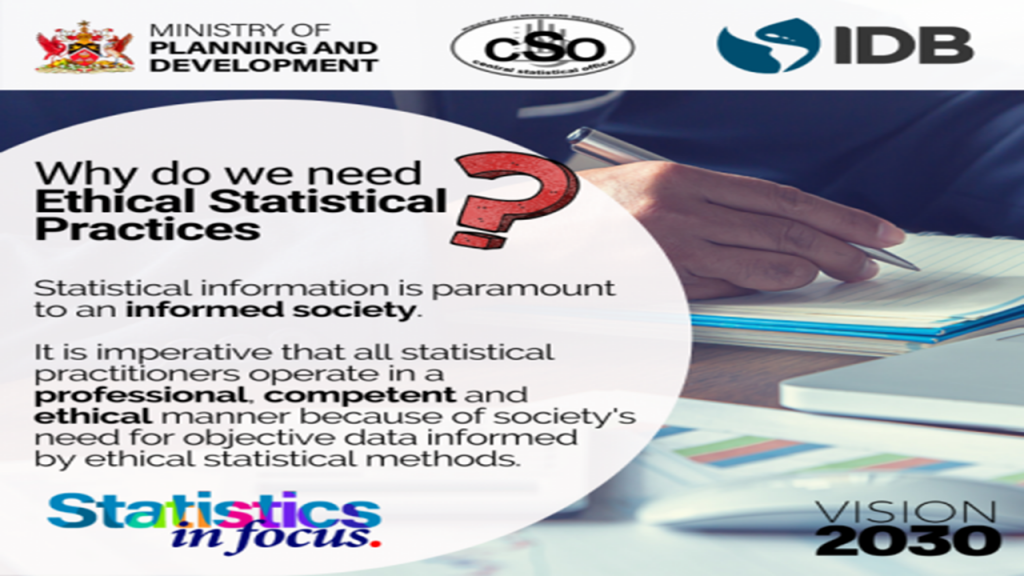Statistics provide the data to support the foundation for an informed society; it combines the capacity to observe with the ability to analyse and make decisions. In fact statistics and quantitative data analysis are critical tools to enhance our understanding of Trinidad and Tobago and how it changes over time.
Since statistical information is so important it is imperative that all statistical practitioners operate in a professional, competent and ethical manner because of society’s need for objective data informed by ethical statistical methods.
Ethical statistical practice relies fundamentally on transparent reports, reproducible results and valid interpretations. Ethical statistical guidelines also aim to promote accountability so that those who depend on statistical analyses can be aware of the standards which they should expect.
High quality data are data collected following the principles of ethical production of official statistics and help with policy decision making across all sectors of society including agriculture, child welfare, the manufacturing sector, culture and regional and international trade.
Adopted in 1994 by the United Nations Statistical Commission (UNSC), the ten Fundamental Principles of Official Statistics (FPOS) are still in use today. They are considered an integral aspect of and a common reference in global and national development agendas. The ten Principles are:
- Relevance, impartiality, and equal access
- Professional standards, scientific principles, and professional ethics
- Accountability, and transparency
- Prevention of misuse
- Sources of official statistics
- Confidentiality
- Legislation
- National coordination
- Use of International standards
- International Cooperation
Principle 1 describes the need for impartial access to official statistics by citizens of any democratic society. It is an indispensable element which serves the economy, the public and the Government by providing information about the economic, social, environmental, and demographic situation.
Principle 2 underscores the importance of methods and procedures for data collection and dissemination built on sound scientific principles and professional ethics. Principle 3 highlights the need for statistical agencies to provide information on the sources, methods and procedures used to ensure correct interpretation of the data. In tandem with Principle 3, commenting on incorrect interpretation and misuse of statistics is the right of any statistical agency as detailed by Principle 4.
Official statistics may be drawn from all manner of sources if they meet the standards set out with regard to quality, timeliness, cost and the impact on respondents: this forms the basis of Principle 5. Individual data collected by statistical agencies are entitled to the strictest level of confidentiality and exclusive use for statistical purposes as laid out in Principle 6. This, as well as other laws used in administering statistical operations are to be made public in keeping with Principle 7.
Principle 8 encourages cooperation among statistical agencies within countries to ensure consistency and efficiency. Enhanced consistency and efficiency can be attained by adhering to Principle 9; the use of international concepts, classifications and methods. Finally, Principle 10 calls for bilateral and multilateral coordination which contributes to the improvement of statistical systems in all countries.
The implementation of the Fundamental Principles takes into account the need for a certain level of autonomy in national statistical systems. Best practices which honor institutional, scientific, and professional independence are all important factors in the implementation process. The ability to orchestrate statistical work programs, facilitate the publication of results as well as manage the budget and the recruitment of staff are determinants of institutional independence. Similarly, the freedom to produce and disseminate statistics, including the determination of the timing and method of data dissemination, the selection of statistical methods, data sources, and definitions used in the process are components of scientific independence. The provision of statistical data free from the undue influence of any political or interest group is considered the equivalence of professional independence. The real or perceived lack of independence can negatively affect the credibility of any statistics produced as well as undermine the viability of policies on which that data was based.
In Trinidad and Tobago, the Central Statistical Office (CSO), established in 1952, aims to facilitate informed decision making with the provision of quality statistical exercises which adhere to international and scientific standards. As mandated by the Statistics Act, the CSO can administer, supervise, and monitor any statistical activity related to the people and the Republic of Trinidad and Tobago.
In keeping with the Fundamental Principles of Official Statistics and the regulations of the Statistics Act, strict confidentiality is observed by statistical officers and staff of the CSO, eliminating the chances of identifying any particular person, entity or business without their consent.
In fact the Statistics Act, Chapter 19:02 also necessitates that “every person employed in the execution of any duty under this Act shall before entering on his duties … take an oath”. This oath proscribes the disclosure of any knowledge or information that they encounter in the performance of their duties.
The CSO remains guided by rigorous international ethical standards related to statistical systems while maintaining its autonomy to best serve the citizens of Trinidad and Tobago.
Author: Central Statistical Office
